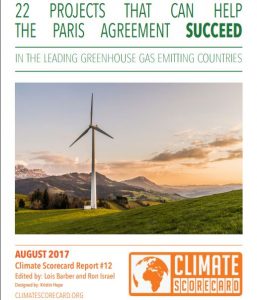Evaluating sources of information before using them helps ensure that the researcher finds trustworthy conclusions. My evaluation criteria help the climate change researcher determine how useful sources of information will be for their project relative to the existing body of relevant knowledge:
- Does the author have relevant expertise? What is their intended purpose? Who is sponsoring this study or initiative?
- Has the work been peer reviewed?
- Who uses this source?
- What do credible scientific organizations say?
In response to the 2015 Paris Agreement the Climate Scorecard team wanted to create a platform for holding countries accountable for honoring their commitments. The initiative serves as a launch pad for policy makers, NGOs, researchers, business leaders, and concerned citizens to increase GHG mitigation efforts using the specific ideas described on the website and in the reports. Two non-profit organizations—EarthAction and The Global Citizens Initiative (GCI)— coordinated this initiative. Campaigners of both organizations demonstrate a consistent commitment to developing global networks of people that value bottom-up engagement towards action for a more sustainable world. Similar and compatible values inspired the Climate Scorecard’s goal of holding countries accountable for honoring their commitments. The organization’s bias for environmental protection and democratic organization inspired Climate Scorecard to make emissions reduction strategies readily available to the online global community, and to provide a resource for calls to action.
The Climate Scorecard Reports publicize progress towards goals promised in the 2015 Paris Agreement by the top 25 greenhouse gas (GHG) emitting countries. The reports contain selected documents and researched profiles about countries on topics including policy evaluations, what leaders support or oppose climate change, climate change’s impacts on economic development, and countries investing successfully in renewable energy. The reports provide policymakers with information to potentially help them achieve their reductions targets.
For the purposes of this evaluation, I will evaluate Climate Scorecard Report #12 which profiles 22 replicable and scalable projects in the leading GHG emitting countries. These projects vary in topic from community mobilization to rural electrification and more.
Contributors of the Climate Scorecard reports include environmental graduate students and young professionals known as Country Coordinators who are responsible for building and supporting networks in their countries. Each country has its own coordinator which adds a level of quality control from country specialization. Ron Israel and Lois Barber, the editors of this report, both have relevant professional experience in international development work, adding a layer of expertise to guide and oversee the selection of content for the reports. Ron Israel, co-founder of GCI, has over 20 years of experience in leading international development projects in environmental protection, sustainable development, global governance, and citizen participation. Lois Barber, executive director of EarthAction has 30 years of experience working in nonprofits on citizen participation in policymaking on environment, peace, and justice issues. In addition to the Climate Scorecard team, university-based experts deal with technical questions related to new information for the website. The open data platform encourages everyone to share information about GHG mitigation projects in the top emitting countries. All content is subject to the judgment of a broad global audience which creates an international standard for public awareness and accountability to those contributing new information.
In this report, each project profile includes a link to learn more about the background of each Country Coordinator and most profiles contain additional references to learn more about the initiatives. Even more references for tracking progress towards the Paris Agreement pledges live on the individual webpages of each country on www.climatescorecard.org.
I believe that Climate Scoreboard is fairly trustworthy on the subject of climate change because its creators have demonstrated a deep commitment and understanding of development projects with significant environmental and human considerations. Their qualifications demonstrate career achievements in mobilizing useful information to concerned citizens and other agents of change around the world. Some of the Country Coordinators have more robust qualifications than others depending on level of education and previous work experience, so verifying the information in the reports with the additional references as well as other credible scientific organizations remains important.
This report serves as an idea hub and starting point for concerned citizens and various stakeholders, however, researchers using this source should use the information provided by Climate Scoreboard to narrow their focus for future research efforts. This report effectively highlights potential projects to help develop mitigation efforts but requires the researcher to follow up for further context surrounding each project’s implementation and success for replication in any other context.
Works Cited
Climate Scorecard Report #12: 22 Projects That Can Help The Paris Agreement Succeed, Edited by Lois Barber and Ron Israel, 2017. http://climatescorecard.org.
“Mission and Principles.” The Global Citizens’ Initiative(TGCI): Building A Sustainable World Community For All. www.theglobalcitizensinitiative.org/mission-and-principles. Accessed 23 Sep 2017.
“Who Are We?” EarthAction. www.earthaction.org/who_are_we.html. Accessed 23 Sep 2017.

